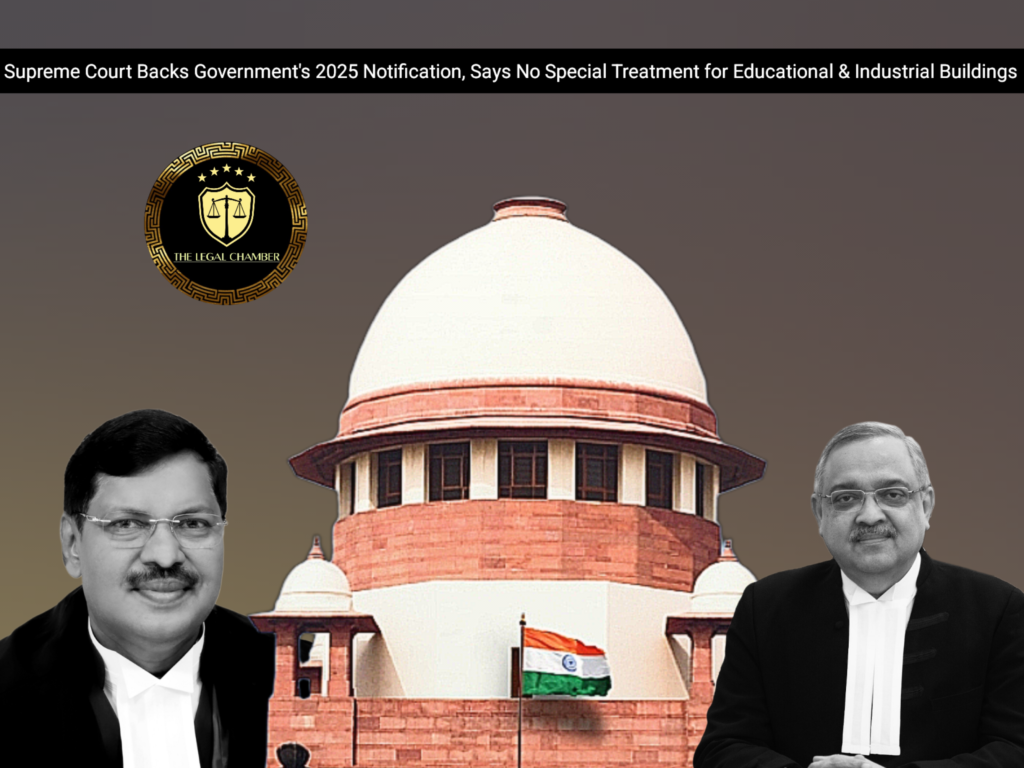
The Supreme Court upheld the 2025 EIA Notification, ruling that General Conditions under the 2006 Notification never applied to building and township projects. It affirmed that State-level expert bodies (SEIAA) are competent to appraise such projects. However, the exemption for industrial and educational constructions was struck down as arbitrary.
Facts Of The Case:
The writ petition challenged the constitutional validity of the notification dated 29th January 2025 and an Office Memorandum dated 30th January 2025, both issued by the Ministry of Environment, Forest and Climate Change (MoEF&CC). The petitioner, an environmental organization, argued that the new notification fundamentally diluted the environmental regulatory regime established by the original 2006 EIA Notification. The core contention was that the 2025 notification illegally removed the applicability of ‘General Conditions’—which mandated central government appraisal for projects near protected areas, critically polluted zones, and eco-sensitive zones—for building, construction, and township projects listed under Entry 8(a) and 8(b) of the schedule, thereby transferring this authority to State-Level Expert Appraisal Committees (SEIAA). The petitioner alleged this was a deliberate attempt to nullify previous court orders that had quashed similar dilution attempts in 2014, 2016, and 2018. The Union of India defended the notification, arguing it provided necessary clarity and that the 2006 notification itself never intended for General Conditions to apply to these specific projects, emphasizing the practical necessity of empowering state-level bodies to manage the high volume of applications.
Procedural History:
The procedural history of this case originates from a writ petition filed directly in the Supreme Court under its original jurisdiction, challenging the 2025 EIA notification. Prior to this, the regulatory landscape was shaped by litigation against previous notifications; the 2014 notification was quashed by the Kerala High Court in March 2024, the 2016 notification was set aside by the National Green Tribunal (NGT) in December 2017, and the 2018 notification was stayed by the Delhi High Court in November 2018. During the pendency of the present petition, the Supreme Court was also seised of an appeal against the NGT’s 2017 decision, which a coordinate bench had reserved for judgment. The petitioner argued this necessitated a pause, but the Court proceeded, distinguishing the issues and ultimately upholding the 2025 notification while striking down a specific exemption.
READ ALSO :Supreme Court Quashes Decree Against Odisha Corp, Clarifies Law on Interest for Pre-1992 Transactions
Court Observation:
In its observations, the Court firmly applied the literal rule of interpretation to the 2006 EIA Notification, concluding that the ‘General Conditions’ were never intended to apply to building and township projects under Entry 8(a) and 8(b), as this was not explicitly mandated in the schedule unlike for other project categories. The judiciary recognized the necessity of balancing environmental protection with sustainable development, acknowledging the practical impossibility for the central ministry to appraise all projects nationwide and affirming the competence of the state-level expert bodies (SEIAA) constituted under the statute. However, the Court found the exemption for industrial sheds and educational buildings to be arbitrary, noting that large-scale construction inherently impacts the environment regardless of its purpose and that no rational nexus existed for such discriminatory treatment, especially as education had become a commercial industry.
Final Decision & Judgement:
The Supreme Court partly allowed the writ petition. It upheld the validity of the impugned notification dated 29th January 2025, except for Note 1 appended to Entry 8(a). The Office Memorandum dated 30th January 2025 was also upheld. Consequently, the exemption granted to projects involving industrial sheds, schools, colleges, and hostels for educational institutions from the rigors of the environmental clearance process was quashed and set aside as arbitrary. The core framework of the notification, which empowers State-Level Expert Appraisal Committees (SEIAA) to appraise building and construction projects, was affirmed as legally sound. No order was made as to costs.
Case Details:
Case Title: VANASHAKTI vs. UNION OF INDIA Citation: 2025 INSC 961 Appeal Number: Writ Petition (Civil) No. 166 of 2025 Date of Judgement: August 05, 2025 Judges/Justice Name: Justice B.R. Gavai & Justice K. Vinod Chandran
Download The Judgement Here